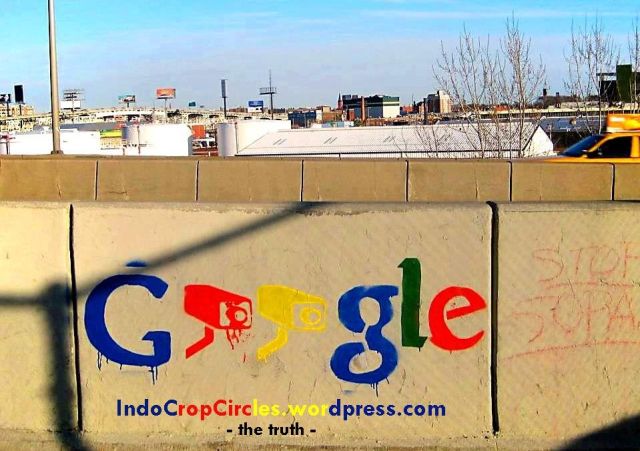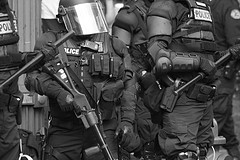“Even if you’re not doing anything wrong, you’re being watched and recorded. …it’s getting to the point where you don’t have to have done anything wrong, you simply have to eventually fall under suspicion from somebody, even by a wrong call, and then they can use this system to go back in time and scrutinize every decision you’ve ever made, every friend you’ve ever discussed something with, and attack you on that basis, to sort of derive suspicion from an innocent life.” – Edward Snowden

In my previous article Do No Evil Google – Censor & Snitch for the StateI addressed my experience with censorship through direct and indirect means by Google, other media related corporations and the Deep State they choose to protect, promote and perpetuate through propaganda. I found it interesting that websites heavily dependent on Google Adsense revenue who normally publish my articles either didn’t publish it or released it at a time when the least amount of visitors would see it. The almighty dollar usually wins out over truth in our one dimensional degenerate capitalism society, driven by greed, consumerism, gluttony and debt.
In this article I’ll examine how Google, Microsoft, Facebook Verizon and the rest of the internet based mega-corporations have consciously cooperated with the NSA and the rest of the surveillance state to violate the Fourth Amendment rights of every American. Our Founding Fathers had plenty of experience with authoritarian overlords who had no hesitation in kicking in the doors of private citizens to search and seize whatever they desired. The men who formulated the Constitution and Bill of Rights were clear and concise in their language. They laid out the right of all citizens to privacy in one perfectly succinct sentence. The putrid den of vipers in Congress today would use 10,000 sentences to insure this right would be null and void.
The right of the people to be secure in their persons, houses, papers, and effects, against unreasonable searches and seizures, shall not be violated, and no Warrants shall issue, but upon probable cause, supported by Oath or affirmation, and particularly describing the place to be searched, and the persons or things to be seized.
Media mouthpieces for the Deep State use their platform to lie, misinform and obscure the truth about a basic right owed to all Americans. They claim we have a living Constitution, while they methodically and systematically murder it. The only rights that matter are the rights of the invisible government of rich powerful men who pull the strings in this corporate fascist surveillance state. Justice Potter Stewart illuminated the Fourth Amendment in the 1967 Katz case. He concluded the Fourth Amendment protects people, not places.
A “search” occurs for purposes of the Fourth Amendment when the government violates a person’s “reasonable expectation of privacy.” Katz’s reasonable expectation of privacy thus provided the basis to rule the government’s intrusion, though electronic means rather than physical entry, was a search covered by the Fourth Amendment, and thus necessitated a warrant. Today, our Big Brother government controllers use the Constitution and Fourth Amendment to wipe their asses, while goliath media corporations cooperate to keep the profits flowing.
“Even though we don’t know which companies the NSA has compromised – or by what means – knowing that they could have compromised any of them is enough to make us mistrustful of all of them. This is going to make it hard for large companies like Google and Microsoft to get back the trust they lost. Even if they succeed in limiting government surveillance. Even if they succeed in improving their own internal security. The best they’ll be able to say is: “We have secured ourselves from the NSA, except for the parts that we either don’t know about or can’t talk about.” – Bruce Schneier
The profane alliance between big banks, big corporations, and big government has created the Big Brother surveillance society we are living under today. And 95% of the populace is either willfully ignorant or perfectly happy with a boot stomping on their face forever. We have willingly become hopelessly enslaved while believing we are free. We think we are free to buy whatever clothes, iGadgets, baubles and trinkets we desire, while becoming imprisoned in the chains of credit card debt hawked by Wall Street bankers. We think we are free to pursue higher education, while being saddled with government peddled non-dischargeable student loan debt and few job opportunities. We think we are free to buy/lease whatever new vehicle we choose every three years, while falling into the trap of lifetime monthly payments to the financial elite. We imagine ourselves free to live in a 4,500 sq foot McMansion, 50 feet from another McMansion, while Wall Street creatively lures you into the shackles of an epoch of debt. We believe we live in a country admired for its morality and freedom, while in actuality the world despises us for our hubris, meddling, murdering and hypocrisy.
We assumed we were free to communicate with other citizens, utilizing the amazing technological advances of the past twenty five years, in accordance with the freedoms guaranteed under the Fourth Amendment. American patriot Edward Snowden has revealed how wrong this assumption has proven to be. The puppeteers who control the politicians and government apparatchiks have no interest in allowing citizens privacy, freedom, liberty or free speech. They have a four pronged approach to controlling the masses.
1. Use media propaganda and modern day bread and circuses (toxic processed food, reality TV, sports, movies) to amuse and confuse the government educated, eyes wide shut, populace.
2. Use wars on poverty, drugs, and terror to keep the willfully ignorant masses cowering in fear, begging for more government programs, and pleading for more laws, regulations and statutes, which strip our freedoms, liberties and rights.
3. Highly compensate the intellectuals, media pundits, economists, and thought leaders to promote the agenda of the ruling class. Truth is of no concern. Propaganda, misinformation, outright lies, and spinning a storyline are the techniques of choice to keep the masses bemused, confused and defused.
4. As the Brave New World techniques begin to fail and more people are awakened to the increasing tyranny of an unelected invisible government, Orwellian techniques are instituted. The metadata collection by the NSA, with the cooperation of corporate America, is being done to intimidate those who might voice discontent and provide the controllers with the means to eliminate opposition and freedom of speech.
A population unable or unwilling to think critically doesn’t comprehend the extreme danger to our civil liberties from the unwarranted intrusion into our private lives by a surveillance police state bent on bribing, coercing and silencing dissent, truth and First Amendment rights. Civil libertarian, John Whitehead, captures the essence of our plight.
“Intrinsically, privacy is precious to the extent that it is a component of a liberty. Part of citizenship in a free society is the expectation that one’s personal affairs and physical person are inviolable so long as one remains within the law. A robust concept of freedom includes the freedom from constant and intrusive government surveillance of one’s life. From this perspective, Fourth Amendment violations are objectionable for the simple fact that the government is doing something it has no license to do–that is, invading the privacy of a law-abiding citizen by monitoring their daily activities and laying hands on their person without any evidence of wrongdoing.
Privacy is also instrumental in nature. This aspect of the right highlights the pernicious effects, rather than the inherent illegitimacy, of intrusive, suspicionless surveillance. For example, encroachments on individual privacy undermine democratic institutions by chilling free speech. When citizens–especially those espousing unpopular viewpoints–are aware that the intimate details of their personal lives are pervasively monitored by government, or even that they could be singled out for discriminatory treatment by government officials as a result of their First Amendment expressive activities, they are less likely to freely express their dissident views.” – John W. Whitehead – A Government of Wolves: The Emerging American Police State
Do No Evil, Unless it is Profitable
“I can’t in good conscience allow the US government to destroy privacy, internet freedom and basic liberties for people around the world with this massive surveillance machine they’re secretly building.” – Edward Snowden


It’s amazing how corporate principles, codes of conduct, ethics, and morality can be cast aside by men when their wealth and power is dependent upon casting them aside. Google’s Do No Evil slogan is now a bad joke as they have consistently ignored their own motto by doing business with evil governments, bowing down to the demands of authoritarian surveillance states, and willingly handing over the private information of people to the government. They have done this in order to boost their profits and enrich their executives. The 120 million internet users in China are too big of a market, with vast profit potential, for Google to pass up over a little torture, murder, and repression by the Chinese government. Google bowed to the Chinese government and produced a censored, state-approved version of its search portal, enabling filters that block search terms such as Tibet, Taiwanese independence, Tiananmen Square protests, Falun Gong movement, freedom, democracy, political protest and prevent the engine from finding certain websites banned by the state. It also does not offer its blog or e-mail services in China in order to comply with government restrictions denying free speech. I guess evil is in the eye of the shareholder.
Human rights groups are the only ones who have called out Google for their hypocrisy, censorship of free speech and worshiping at the altar of the almighty yuan. Google is not alone in kowtowing to the authoritarian regime in China, as Yahoo, Microsoft, Facebook and any other internet provider must agree to censorship and turning over private information to the authorities. Microsoft shut down the U.S. hosted, pseudonymous blog of a Chinese journalist, and Yahoo turned over to the Chinese government personal e-mail files of an online dissident who was subsequently sentenced to ten years in prison. These corporate tools of the state care not that China is still one of the most repressive countries on Earth, with tens of thousands jailed dissidents and political prisoners, as well as being a serial abuser of copyright laws.
The Communist Party’s propaganda department has ramped up operations at Office 1106, an organization which trawls cyberspace for subversion. All websites, bloggers and bulletin-board operators must register with the government and Beijing has a special internet police force responsible for shutting down “unacceptable” sites, blocking foreign news sites and jailing people for online postings. The press freedom group Reporters Without Borders described Google’s acquiescence to authoritarianism as “a black day for freedom of expression in China”. They realized this was the first step on a downward path to loss of freedom around the world:
“But they continue to justify themselves by saying their presence has a long-term benefit. Yet the internet in China is becoming more and more isolated from the outside world and freedom of expression there is shrinking.”
The Free Tibet Campaign describes Google’s surrender as an endorsement of censorship and repression. “With this move, Google’s motto ‘do no evil’ is in smithereens,” said the campaign’s spokeswoman Alison Reynolds. “This also further contradicts those political leaders who attempt to convince us that foreign business can change China for the better.” Google Earth does not recognize the word Tibet. These corporations use the predictable spin that it will notify users when access had been restricted and argues that it could play a more useful role in China by participating than by boycotting it. Tell that to the thousands of freedom fighters languishing in gulags. We know Google willingly censors on behalf of governments. Based on the revelations from Edward Snowden, you can be sure Google provides the identities of Chinese citizens who voice dissenting opinions about the Chinese government directly to the Chinese secret police. We are all enemies of the state and subject to surveillance, censorship and ultimately imprisonment. We are living in a modern technological dystopian nightmare, with no hope of awakening.
“The world is not sliding, but galloping into a new transnational dystopia. This development has not been properly recognized outside of national security circles. It has been hidden by secrecy, complexity and scale. The internet, our greatest tool of emancipation, has been transformed into the most dangerous facilitator of totalitarianism we have ever seen. The internet is a threat to human civilization.
These transformations have come about silently, because those who know what is going on work in the global surveillance industry and have no incentives to speak out. Left to its own trajectory, within a few years, global civilization will be a postmodern surveillance dystopia, from which escape for all but the most skilled individuals will be impossible. In fact, we may already be there.
While many writers have considered what the internet means for global civilization, they are wrong. They are wrong because they do not have the sense of perspective that direct experience brings. They are wrong because they have never met the enemy.” – Julian Assange – Cypherpunks: Freedom and the Future of the Internet
Big Google and the Surveillance State
“Big Brother in the form of an increasingly powerful government and in an increasingly powerful private sector will pile the records high with reasons why privacy should give way to national security, to law and order and the like.” – William O. Douglas – Points of Rebellion, 1969

“We have seen segments of our Government, in their attitudes and action, adopt tactics unworthy of a democracy, and occasionally reminiscent of totalitarian regimes. We have seen a consistent pattern in which programs initiated with limited goals, such as preventing criminal violence or identifying foreign spies, were expanded to what witnesses characterized as “vacuum cleaners”, sweeping in information about lawful activities of American citizens. The tendency of intelligence activities to expand beyond their initial scope is a theme which runs through every aspect of our investigative findings. Intelligence collection programs naturally generate ever-increasing demands for new data. And once intelligence has been collected, there are strong pressures to use it against the target.” ― Church Committee -1975
William O. Douglas and Frank Church foresaw the overreach of the surveillance state decades before Edward Snowden nobly sacrificed his future and risked his life to reveal the vast illegal collection of private phone calls, texts, emails, downloads, and every electronic communication of every person in America by a secret government agency operating in the shadows. The Chinese experience was a prelude to how Google, Yahoo, Verizon and the rest of the corporate internet/telecommunication complex would do whatever was demanded by the all-powerful NSA in order to expand their profits and avoid the ire of the Deep State.
Edward Snowden threw a monkey wrench into the well- oiled gears of the cooperative efforts of the NSA, the British NSA – GCHQ, Google, Yahoo, Microsoft, Facebook, Apple, Verizon, etc. to conduct the greatest mass spying program in world history. The denials, finger pointing, obfuscation, and outright lies by government bureaucrats, politicians and corporate executives came fast and furious after Snowden’s revelations. They were caught red handed committing illegal acts, in violation of the Fourth Amendment.
Denial press releases regarding knowledge of this mass spying scheme from Google and Facebook appeared to be written by the same maggot public relations firm, as they were virtually identical.

The reactions of Google and Yahoo were reminiscent of Captain Renault declaring “I’m shocked, shocked to find that gambling is going on in here!” in Casablanca.
“We are outraged at the lengths to which the government seems to have gone to intercept data from our private fiber networks, and it underscores the need for urgent reform.” – Google
“We have strict controls in place to protect the security of our data centers, and we have not given access to our data centers to the NSA or to any other government agency.” – Yahoo
These faux expressions of outrage and surprise have been revealed by Snowden to be disingenuous and insincere. Glenn Greenwald and the Guardian verified the authenticity of a 41-slide NSA PowerPoint presentation, classified as top secret, used to train intelligence operatives on the capabilities of the PRISM program. The presentation claims “collection directly from the servers” of nine major US service providers, including Microsoft, Yahoo, Google, Facebook, and Apple. The presentation also claims the program is run with the assistance of these companies.
Once they were caught in a lie, Google and the rest of the co-conspirators in this crime tried to backtrack and say they were just obeying their masters at the NSA. In a statement, Google said: “Google cares deeply about the security of our users’ data. We disclose user data to government in accordance with the law, and we review all such requests carefully. From time to time, people allege that we have created a government ‘back door’ into our systems, but Google does not have a back door for the government to access private user data.”
Google is supposed to be the most highly advanced cutting edge tech company on the planet, but somehow their entire system is unencrypted and available to anyone with the means to access it. That sure seems convenient. They have plausible deniability, while allowing the NSA to syphon every piece of electronic communication on its networks. No wonder this NSA diagram had a big smiley face on it.

Detail of an internal “NSA presentation slide” published by the Washington Post. The sketch shows where the public Internet meets the private cloud maintained by Google, and points out — with a smiley face — that the data within the cloud is unencrypted.
The documents released by Snowden forced Google to admit to willingly providing data, names and communications directly to the NSA. Google has a special server drop-box for the NSA where requested and approved files are placed to be taken by the NSA via secure FTP. Some printed records are delivered by hand. How much data passes through this hand-off process isn’t known because the company has refused to reveal that information.
With all the brainpower at Google HQ it is beyond laughable to believe they had no idea the NSA was collecting metadata on such a vast scale. They allowed this to happen with a wink and a nod in order to keep profits flowing. Google, Yahoo and the rest of the captured high tech industry sold out the American people for profits. They were willing participants in the largest crime in U.S. history, and there are no repercussions or prosecutions because their co-conspirators are the very government who would have to prosecute them.
The supposedly legal aspect of this spying program allows the NSA to gather huge amounts of Internet communications by legally compelling U.S. tech companies, including Google, to cooperate with officials and turn over all data that matches secret court approved search queries. This is authorized under Section 702 of the FISA Amendments Act. PRISM operations are overseen by the Foreign Intelligence Surveillance Court (FISC). None of this was known prior to Edward Snowden nobly deciding he could not let this go on in good conscience. Neither the government, Google nor the other communications companies would have ever revealed this program. Of course, the non-legal vacuuming of metadata is far worse and has no support whatsoever under the U.S. Constitution.
To give you some perspective on the scale of this criminal enterprise, NSA analysts processed more than 180 million records within a time span of 30 days from Google’s metadata system. The NSA gained access to who sent the message, who received the message, what the message contained and all audio and video sent on this system. The NSA secretly tapped into the private fiber-optic networks that connect Google’s and Yahoo’s worldwide data centers, allowing the spy agency to suck up “at will” bulk metadata and content belonging to users of the companies’ services.
Under a program called MUSCULAR, a joint project with British NSA counterpart the GCHQ, the NSA takes advantage of overseas taps to intercept data flowing within Google’s and Yahoo’s geographically distributed data “clouds,” where multiple copies of user data are stored unencrypted. Google “PREF” cookies, which can help identify a user’s web browser and serve up personalized ads allows NSA to single out an individual’s communications among the sea of Internet data in order to send out software that can hack that person’s computer.
The question is why is our government doing this? Are they doing it for our protection or for our subjugation? The War on Terror is really a cover for corporate fascists to further enrich themselves and gain a stranglehold on the government and financial system. There is little or no threat from terrorists in this country. The few psychopaths out there cannot impact this country in a major way. But, fear can be used by those in power to solidify their control over the masses. Before 9/11 it would have seemed unthinkable for our country to descend into a dystopian society, surrendering privacy, anonymity and individualism.
This bulk collection of private communications is their ace in the hole. Anyone who dares to question authority, resist the establishment or voice a dissenting opinion can be discredited and destroyed with personal information gathered by the NSA. One method for undermining those deemed “radicalizers” by the NSA is to document their online porn habits. The documents released by Snowden reveal NSA plans to blackmail non-conformists, as explained by Glenn Greenwald.
“Among the vulnerabilities listed by the NSA that can be effectively exploited are ‘viewing sexually explicit material online’ and ‘using sexually explicit persuasive language when communicating with inexperienced young girls.’ “
If the Deep State cannot bribe you with cash, they will invade your privacy and use personal communications to bribe you. Censorship can be exercised through many channels. The saddest part thus far is the lack of outrage by the American people. The majority of mouth breathing techno-narcissists in this country have never heard of Edward Snowden. They don’t realize he is the Paul Revere of the next American Revolution. They don’t understand the implications of not standing and fighting during this Fourth Turning. Unless enough people stand up and say NO, we will end up with turnkey tyranny.

“The great fear that I have regarding the outcome for America of these disclosures is that nothing will change. People won’t be willing to take the risks necessary to stand up and fight to change things… And in the months ahead, the years ahead, it’s only going to get worse. The NSA will say that… because of the crisis, the dangers that we face in the world, some new and unpredicted threat, we need more authority, we need more power, and there will be nothing the people can do at that point to oppose it. And it will be turnkey tyranny.” – Edward Snowden
In the final segment of this three part article – Fourth Turning: The People vs Big Brother – I’ll discuss how I think this all fits into the Fourth Turning Crisis we are currently experiencing.






